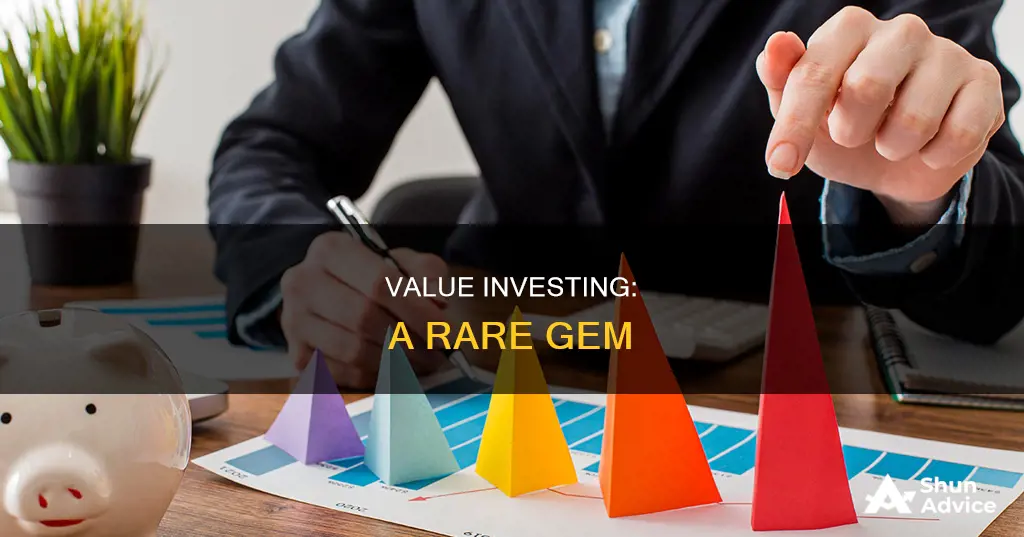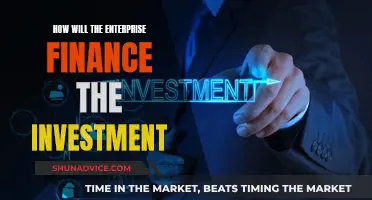
Value investing is an investment strategy that involves buying stocks that are undervalued by the market and holding onto them until they reach their full potential. The goal is to find companies that are trading at a discount to their intrinsic value, or the true worth, of the company. This strategy was popularised by Benjamin Graham in his 1949 book, The Intelligent Investor.
Value investors believe that the market eventually corrects itself and that by holding onto undervalued stocks, they will eventually be rewarded with a higher price. This strategy requires patience, as it can take a long time for a value stock to rebound. It also requires diligent research to identify companies that are truly undervalued.
Some of the most famous value investors include Warren Buffett, Benjamin Graham, David Dodd, Charlie Munger, and Seth Klarman.
| Characteristics | Values |
|---|---|
| Investment strategy | Buying stocks that are undervalued by the market |
| Investment focus | Stocks that are underappreciated by investors and the market at large |
| Investment belief | The market eventually corrects itself |
| Investment timing | Long-term strategy |
| Investment research | Requires a lot of research |
| Investment risk | Low-to-medium-risk strategy |
What You'll Learn

Value investors seek out stocks that are undervalued by the market
Value investors use financial analysis to identify stocks that are trading for less than their intrinsic or book value. They look at a company's financial performance, revenue, earnings, cash flow, profit, and fundamental factors such as brand, business model, target market, and competitive advantage.
Some specific metrics that value investors use to identify undervalued stocks include:
- Price-to-book (P/B) ratio: This measures the value of a company's assets relative to the stock price. If the price is lower than the value of the assets, the stock may be undervalued.
- Price-to-earnings (P/E) ratio: This metric shows a company's track record for earnings and can indicate if the stock price is undervalued.
- Free cash flow: This is the cash generated by a company's revenue or operations after expenses have been paid. A company with positive free cash flow has money left over to invest in its future, pay off debt, pay dividends, or repurchase shares.
Value investing requires a lot of research and patience. It often involves buying and holding stocks for the long term, waiting for the market to recognize their true value. It can be challenging to identify undervalued stocks, and there is always the risk that the stock may not perform as expected. However, value investing can offer significant returns for those willing to put in the time and effort.
Education and Investment: Any Correlation?
You may want to see also

They buy businesses, not stocks
Value investors are focused on buying businesses, not stocks. This means that they look beyond the stock price and market noise, and instead focus on the fundamentals of the company that the stock represents.
Value investors are not interested in following trends or speculating. They are not looking for a quick profit, but rather they are seeking to buy and hold for the long term. This approach requires a larger time commitment for research, but it also means less time spent buying and selling, and fewer commission payments.
When deciding which companies to invest in, value investors should:
- Love the business they buy into. It's important to be passionate about the company and know everything about it.
- Invest in companies they understand. If you don't understand what a company does, then you probably shouldn't buy shares in it.
- Find well-managed companies. Good management can add value beyond a company's hard assets, while bad management can destroy solid financials.
- Not stress over diversification. It's better to keep proper track of only a few stocks at a time.
Theranos Investors: Medical Backgrounds?
You may want to see also

They love the business they buy into
Value investing is an investment strategy that involves buying stocks that are undervalued relative to their intrinsic value and underappreciated by investors and the market in general. A key principle of value investing is to "love the business you buy into". This means being passionate about knowing everything about the company and its inner workings.
When it comes to value investing, it is important to strip the attractive covering from a company's financials and get down to the naked truth. Many companies may look far better when judged on the basis of basic ratios such as price-to-earnings (P/E), price-to-book (P/B), and earnings-per-share (EPS). However, it is crucial to look beyond these ratios and understand the quality of the numbers that make up those figures.
By keeping standards high and ensuring that a company's financials look good, both dressed up and undressed, investors are much more likely to keep the stock in their portfolio for the long term. If things change, they will notice it early. If they like the business they buy, paying attention to its ongoing trials and successes becomes more of a hobby than a chore.
It is also important to understand the business and what it does. If an investor doesn't understand what a company does or how it operates, then they probably shouldn't be buying shares in it. This is a limitation of value investing that critics often focus on. Investors are limited to seeking out businesses that they can easily understand because they need to be able to make an educated guess about the company's future earnings. The more complex a business is, the more uncertain projections are likely to be. This shifts the emphasis from "educated" to "guess".
However, it is possible to buy businesses that are liked but not completely understood, but this must be factored in as added risk. Any time a value investor has to factor in more risk, they need to look for a larger margin of safety, which means a bigger discount from the calculated true value of the company. There can be no margin of safety if the company is already trading at multiples of its earnings, which is a strong sign that the business is not a value play.
Simple businesses also have an advantage because it is harder for incompetent management to hurt the company. Management can make a huge difference in a company. Good management adds value beyond a company's hard assets, while bad management can destroy even the most solid financials.
Poor People: Investing Risk?
You may want to see also

They invest in companies they understand
Legendary investor Warren Buffett is famous for advising investors to "buy what they know". This means investing in companies that you understand, or at least know enough about to explain how they make money.
Buffett's advice is not without merit, but it is not necessarily the best strategy for investment success. There are some limitations to this strategy. For example, investors might achieve greater success by investing in companies that they can learn about, rather than sticking to what they know.
It takes time to fully understand a company. Many new investors will find it difficult to delve into the business models or 10-K statements of publicly traded companies. It can be challenging to listen consistently to companies' earnings calls, and even if one does, they might not fully grasp what is being discussed. Understanding a company's balance sheet and overall financial direction requires specialised knowledge.
By only investing in companies that you are comfortable with, you risk missing out on fast-rising companies. Most of the biggest gains from stocks typically come from companies in the earlier phases of growth. Well-known companies usually cannot grow at the same pace as they did when they first became publicly traded.
Value investors like Buffett select stocks that appear to be trading for less than their intrinsic or book value. They believe the market overreacts to good and bad news, resulting in stock price movements that do not correspond to a company's long-term fundamentals. This overreaction offers an opportunity to profit by purchasing stocks at discounted prices.
However, this strategy requires diligence and patience. It can take years before your stock investments pay off, and you will occasionally lose money.
Robinhood: Still Relevant?
You may want to see also

They find well-managed companies
Value investing is a strategy where investors seek out stocks that are undervalued by the market and trade for less than their intrinsic values. Value investors look for companies with good, strong management.
Integrity, Intelligence, and Energy
Warren Buffett advises that investors should look for three qualities of good management: integrity, intelligence, and energy. He adds that "if they don't have the first, the other two will kill you". You can get a sense of management's honesty by reading several years' worth of financials. How well did they deliver on past promises? If they failed, did they take responsibility or gloss over it?
Act Like Owners
Value investors want managers who act like owners. The best managers ignore the market value of the company and focus on growing the business, thus creating long-term shareholder value. Managers who act like employees often focus on short-term earnings to secure a bonus or other performance perks, sometimes to the detriment of the company in the long term.
Compensation
Compensation is often a dead giveaway. If you're thinking like an owner, you pay yourself a reasonable wage and depend on gains in your stock holdings for a bonus. At the very least, you want a company that expenses its stock options.
Management Screen
You can use the Management Screen to assess management quality.
Quality Index
The Quality Index proves that the stock of well-managed companies outperforms that of their competitors.
Financial Statements
Value investors should read through financial statements to seek out mispriced stocks and look to capitalize on a possible reversion to the mean.
Dogecoin: Worthy Investment or Just a Meme?
You may want to see also
Frequently asked questions
Value investing is an investment strategy that involves buying stocks that are undervalued by the market and holding onto them until they reach their full potential.
Value investors seek to uncover the intrinsic value of assets and develop the patience to wait until they can be purchased at prices that are lower than this intrinsic value.
Value investing is a high-risk strategy that can be emotionally demanding. It requires a lot of research and patience, and there is always a chance that the investment will fail and lead to losses.
Some of the most famous value investors include Warren Buffett, Benjamin Graham, Charlie Munger, and Seth Klarman.
Some alternatives to value investing include growth investing, momentum investing, index investing, and technical analysis.







